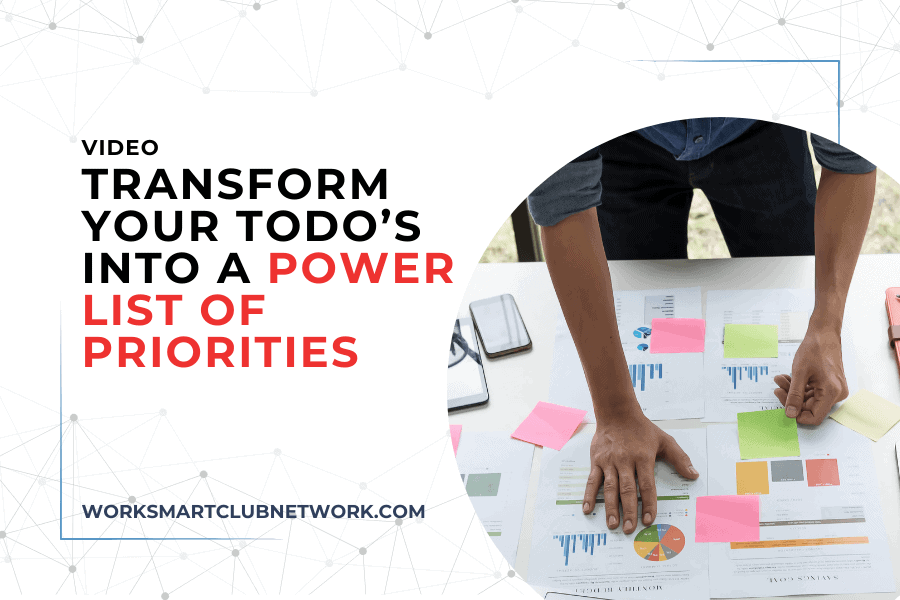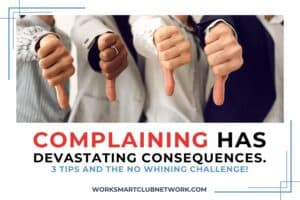Do you have priorities? We all have some type of to-do list. I worked with one manager not too long ago, and she had 20 things on her to do list. It was mixed up with her personal family issues, as well as what she wanted to get done at work. Well, there’s no way that she was going to get 20 things done in her day. So every day, while she puts in a tremendous amount of effort, she goes home never feeling like she got anything done, and that’s because she wasn’t really focused on what was most important.
Have you ever done an inventory of EVERYTHING you have to do? It may sound daunting, yet it is a great way to see what you have committed to and where your mental energy and your time is going. Give yourself at least a half an hour, it may take longer, but give yourself at least a half an hour to get started. It will be worth it.
The Priority Matrix
The priority matrix for those of you who may not know about it is basically four quadrants. There are four categories that you can put your activities in, in the course of a day. Important and urgent is one category. Important and not urgent is another one. Urgent and not important, and then not important and not urgent. Those are the four categories. Let’s break it down.
Important and Urgent
If you have something that’s important and urgent, that more than likely is something that’s unexpected that came up, that you didn’t know about. Someone had to be rushed to the hospital. I mean, that’s a big, important and urgent issue. But at work it could be all of a sudden you found out that a regulator is coming in and they’re going to do an inspection. That’s important and urgent. After that event, you want to go back and see, was that something I missed or was that really an urgent thing? Did it really just show up on the spot or was I told about it and I forgot? You always want to evaluate whatever happens.
Before we get to the next category, the important and urgent things aren’t always things that you can predict. When you do a weekly review, for example, you may look back and say, “Okay, I could have better prepared for that.” So go back and listen to or read the daily review and I think that will explain what that process is about.
Important and Not Urgent
The next category is important and not urgent. Now this actually is the category that you want to focus on; important and not urgent. This category is where you also put your self-care. How do you recharge your battery? How do you rejuvenate yourself? Those are all activities that my guess is you put off until you have the time, or the weekend, and then on the weekend there are all these other things that are needed. So, you never get to do it. Self-care is one of those activities that is absolutely critical and it should be built into every day.
Important are also those mission critical objectives. What is it that you’re charged to do? What is the big outcome that your boss is looking for? What is the big outcome in your own personal life that you need to achieve? Are you going for a promotion? So have you done the research on the types of jobs available? Have you taken care of your resume? Do you have your strategy? Important and not urgent is the category you ordinarily would focus on, but unfortunately the next category tends to pull everybody away from that, and that is urgent and not important.
Urgent and Not Important
Urgent and not important are essentially other people’s fires. If you’re running around solving other people’s problems, they are your subordinates or they’re people that are on your team. And they’re continually asking you, what would you do, what about this, can you believe this happened, and they come to you either complaining or asking for your help, you are pulled away from those things that you need to do. How can you better prepare your team and your people so they can learn to solve their own problems? I’m actually going to be doing a video and blog on that, so look forward to that coming in the future.
Not Important and Not Urgent
And then finally the category of not important/not urgent. This is the time-wasting category. Are you doing things that you’re doing because you’re actually stealing a little downtime? That’s what I call it. If you don’t have self-care built into the important/not urgent category, you’re going to often find yourself stealing time. You’re going to scroll through social media and you’re going to unwind that way, but what you actually do is flatten your mind and you actually lower your energy. It’s actually the wrong thing to do. The not important/not urgent activity, busy work type behaviors that aren’t really going to advance your agenda, but maybe you feel good doing them because you get a little sense of accomplishment. But, it’s a false sense of accomplishment because you’re not getting anywhere.
Take a look at what your activities are in the course of the day. I want you to make a list and have each of these categories on that list. Write out your activities and put them in a category. I know that sounds like a lot of work, but believe me, it’s going to pay off. It’s really going to help you think through what am I doing, and am I accomplishing what I need to, or am I stuck in other people’s fires? Do I need to learn to say no? Do I need to be more assertive? I highly recommend you do this at home also because your family may be scattered and going in a lot of different directions, but all these tools that we use for work. You can also transfer them to your family.
Before you even start managing your time, you’re going to have to better understand what am I doing in the day? What am I spending my time on? Am I spending my time over here because I really enjoy coaching my team, helping people do a better job, but I’m avoiding the big issue over here, which is structuring my own score card and defining my outcomes and achieving my objectives? This is actually why coaching is so helpful. This is what I do with people. I help you focus on those most important things and take a look at whatever the resistance or the barriers are that keep you from achieving that. Spend the time and put them in those categories that I’ve shared.
Now just as an afterthought, the not important/not urgent category a lot of people think is where they should put their play time. I don’t think so. I think that belongs in the important category. The not important/not urgent category is a category you want to do less of. You don’t want to actually spend time on things that aren’t important and aren’t urgent. You want to delegate those to someone else, or you want to delete these types of activities.
Keep in mind that time is the only resource we can’t get back. We can get more money, we can get more people, we can get more supplies, but we can’t get more time. So if you are focused on your goals, you want that promotion, you want to make more money, you want to start that business, you want to do something, go back to school, have a family, you’re going to have to structure your time because that is limited. I know that if you do this, it is going to bless you because you are going to be much more organized.









Responses